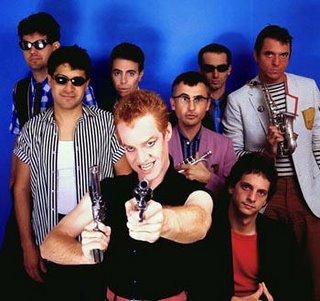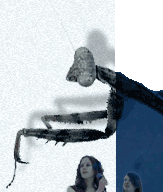|
Tuesday, June 24, 2008
It would seem to be a natural given that horror fans would love Oingo Boingo, but sadly, it's all too often not the case. Despite complex orchestrations, beautiful melodies and a dark slant to most of their music, I've noticed a lot of negativity toward the band. I think I know part of the reason why that is.
Many critics savaged Boingo from from the start. Why? Gee, could it be a scathing song about rock journalists called Imposter, from their first album? Take a listen. I've always loved Imposter, partially because it's a kick ass tune and partially because I've always hated rock journalists. Nearly all of them, anyway. No doubt they had their little feelings hurt by the song and they got their revenge the best they could. Not that it deterred Danny Elfman's career a bit.
Sadly, those pathetic bastards have more sway than they deserve and whether they'd admit it or not, the massive bad press about Oingo Boingo affected a lot of people's opinions.
Oingo Boingo started out as The Mystic Knights of the Oingo Boingo and they were a musical/theatrical group. Their deranged show contained elements of cabaret, Dadaism, Cab Callaway and other forms of barely-controlled insanity. The troupe was led by Richard Elfman, who became more interested in film. This led to the delirious Forbidden Zone, a black and white mindfuck of an acid trip film that defies description.
With Richard Elfman off in a different direction, the leadership of the band fell to brother Danny. Danny Elfman decided to go into a more traditional musical form and turn the band into a ska group. The name was shortened to merely Oingo Boingo and they went on to have a very successful run.
Most know Oingo Boingo from their appearance in the hilarious Rodney Dangerfield movie, Back to School. Boingo played what became their signature piece, Dead Man's Party, in it.
Danny's fascination with the macabre bled into his songwriting and many of the songs dealt with mortality, yet never seemed to be morbid. The message was to enjoy, dance and party while you're still here, because death was eventually waiting for us all.
The band enjoyed several years of sold-out shows and popular songs, but as their sound began to change, Oingo Boingo lost a lot of their audience. 1990's Dark at the End of the Tunnel was more introspective and melodic and featured less ska-influenced party music. I personally felt that it was their finest work up to that point.
Danny Elfman's symphonic arrangements were naturally suited to the movies and Tim Burton approached him to score his first film, Pee Wee's Big Adventure. This successful collaboration led to a long and fruitful relationship between the two oddball personalities. Beetlejuice came after Pee Wee's Big Adventure and it was even more of a success. But it was with 1989's Batman that Elfman and Burton really hit it big. The movie was huge and the music of Danny Elfman has been in constant demand ever since then. But it was not without controversy.
A music professor named Micah Rubenstein wrote an outraged letter to Keyboard Magazine in response to an interview with Elfman, accusing him of 'glorifying musical ignorance'. Elfman's incensed rebuttal is printed in its entirety here.
I've heard people say that "all of Danny Elfman's film scores sound the same", which is completely wrong. Yes, he often uses a signature sound, especially in the comic book movies he scores, but Dead Presidents sounds nothing like Freeway. Which sounds absolutely nothing like the music for Planet of the Apes.Elfman's theremin-heavy SF music for Mars Attacks! bears no resemblance to the sound of Big Fish. You get the picture.
I was a huge Oingo Boingo fan in the early-mid 90's, just in time for the final rock album by the band. This time the album was simply called Boingo and it is arguably the best thing they ever did. I also think it's one of the best albums I've ever heard, period. Sadly, too few people have listened to it. Gone (well, mostly) is the horn section and in place there is extra guitar work courtesy of Vandals player, Warren Fitzgerald. He, along with Steve Bartek and Danny Elfman, play densely layered work that is almost an orchestration of guitars. And Danny Elfman's songwriting has never been richer or more powerful than on Boingo.
In 1995, Danny Elfman announced the retirement of Oingo Boingo. Their final performance would be their annual Halloween show, which took place at the Universal Amphitheater. The show was captured on both audio CD and DVD. It remains, along with Talking Heads' brilliant Stop Making Sense, the best concert film I've ever seen.
Unlike many other recording acts, Oingo Boingo's retirement seems to be genuine. I guess with the kind of money Danny makes with movie soundtracks, he can afford to hang up the touring. But he says that he has permanent hearing damage from playing with the band and that he will never do so again.
Danny Elfman had this to say about it: Quite simply... the time was right. After 17 years together, it finally occurred to me that we had survived about 16 years longer than I had expected... pretty good by any standards I think. It's been good, crazy times, and I'm always amazed how loyal our fans have been, but I think it's better to let things go before they turn sour. Also, scientifically speaking, modern research has recently proven that after a band has been together longer than a decade, the risk of the dinosaur factor kicking in increases exponentially each year thereafter. In short, it's been fun. Adios Amigos.

|





